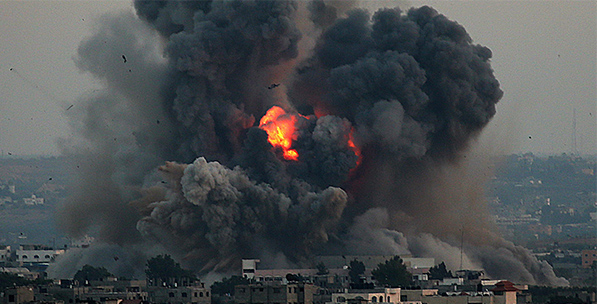If you find the above question interesting, try asking it within the context of the Middle East. As soon as I started typing these words, I received the following text message notification from a news agency: "Israeli PM decides to 'further intensify' attacks on Hamas." The question of what Israel cannot become has a lot to do with this text message. After all, Israel has been an entity which heavily relied on "further intensify" since its foundation. To be perfectly honest, I hardly think anyone would be surprised if Israel just replaced "beyond belief," the slogan of its tourism campaign, with "further intensify."
The phrase "further intensify" perfectly describes Israel's story and not only the modern part. Benjamin Netanyahu's statement embodies the entire theological, historical and political baggage, not only of Israel but also of the U.S., whose support for Israel has greatly contributed to the crisis at hand. Seriously, what phrase but "further intensify" could better describe U.S. policies since Israel's foundation?
Israel inherently represents a living contradiction as a physical resident of the Middle East that thinks in Washington terms. The no-longer-surprising attacks on Gaza based on the premise that the way of life of an entity, which derives its worldview from the Holocaust and its habitat from occupation, is at risk…Today, Israel does exactly the same thing as 2008 and 2012, as the Gaza massacres merely attest to a shallow strategy. In 2008, Israel attacked Gaza when an agreement with Syria, brokered by Turkey, was around the corner after years of conflict. Again in 2012, the attacks came at a time when the Arab revolts set the entire region in motion. It spills blood yet again in Ramadan 2014.
Between 2008 and the present, Israel has been unable to develop a new perspective about itself, the region and the future, and instead sought to push the occupation forward through settlers. It completely misread the Arab revolts and the emerging wave of change in the region. Israeli authorities mistook the reinstatement of the Egyptian status quo and Bashar Assad's destruction of Syria as positive developments. Having carefully timed the 2008 massacres to coincide with the Bush presidency's end, Israel now is seizing the opportunity that the crippled Obama foreign policy presents as a means to consolidate the status quo instead of making peace with Palestine.
Agitated by the Hamas-Fatah reconciliation deal, Israeli authorities were encouraged by the fact that the U.S. kept a safe distance from the arrangement and ignored that the worsening embargo on Gaza after the Abdel Fattah el-Sissi's coup paved the way for a more intense crisis. In the final analysis, between 2008 and 2014 alone, a number of developments had a fundamental influence on the Palestinian question but Israel stuck to what it does best: Further intensify! Truly, the Israeli authorities have been rather consistent in their attitude, while the occupation and the deadlock became more and more intense.
What now? The answer is hidden behind the above question: What will not become of Israel? With regard to Israel itself, everyone would agree that "more of the same" leads to a familiar path with neither peace nor reconciliation, which, in turn, means that Israel cannot become a real state and instead will stick around like the problem-ridden project it is. Why not? It enjoys the invaluable support of not only the U.S. but a number of world powers such as Marshall Islands, Micronesia, Nauru, Palau, Czech Republic, Panama and Canada!







